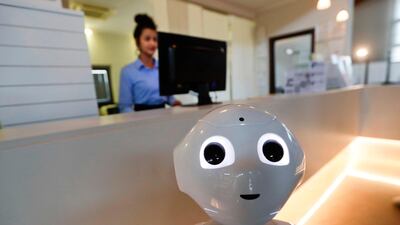Business leaders are not ready for robotics and machine learning playing an increasing role in the workforce, an expert says.
“More than 80 per cent of today’s jobs, including legal services, human resources, transport and others will significantly be affected by the automation technologies,” said Mohammed Amin, senior vice president at data storage company Dell EMC.
“Some jobs will be either eliminated or exist as different kinds of jobs. There are several aspects and challenges to be considered for this type of transformation. Changes are happening so fast and sometimes we are a bit behind.
“The workforce being not ready for the digital transformation is identified as one of the major obstacles.
“Some sectors that will be affected by the digital transformation and robotics, include education, transport, human resources, logistics or supply chain, customer service troubleshooting, marketing and communications.”
Dell Technologies, which helps customers in the region to accelerate their digital transformation, has conducted a new study involving 3,800 business leaders and employees in countries including the UAE.
The study shows that we are entering the next era of human-machine partnerships with a divided vision. The survey demonstrates that many jobs will be replaced by robotics by 2030 across the world.
Ninety-six per cent of those surveyed said that organisations would replace their manpower with automation by 2030.
“As organisations prepare to enter this next era of human and machine partnership, business leaders are torn between two extreme perspectives about the future,” Mr Amin said.
“Some of them are optimistic, while others are worried about the future. This would make it difficult for organisations to prepare, hampering business leaders’ efforts to handle fast-changing technological transformation.”
Mr Amin highlighted the importance of changing learning patterns and methods to deal with the new reality.
Sixty-three per cent of the surveyed business leaders believed that schools would need to instruct students how to learn, rather than what, to prepare them for jobs.
“Those jobs do not exist yet, therefore students need to be well prepared for the next era,” Mr Amin said.
The survey predicts that 85 per cent of jobs that will exist globally in 2030 have not yet been invented.
“We are entering an era of enormous change that will fundamentally alter how businesses function,” he said. “Most business leaders in the region are uncertain of what the next 10 to 15 years will look like, and are struggling to cope with the rapid pace of change.
“A large majority are looking at embracing change and new technology in their digital business plans for the next five years.
______________
Read more
Life in 2028: how advances in AI could change our lives for the better - and worse
500 Emirati men and women are first to be trained in batch of AI specialists
AI will complement jobs not destroy them
______________
“It is becoming increasingly clear that businesses can either transform their IT, workforce and security and play a defining role in the future or be left behind.”
Mr Amin said that robotics would take over many jobs and that businessess should prepare their workforce to become more creative and innovative.
Forty-three per cent of those surveyed said that business leaders should set up a chief artificial intelligence unit to supervise human-machine partnership and speed up digital transformation.

